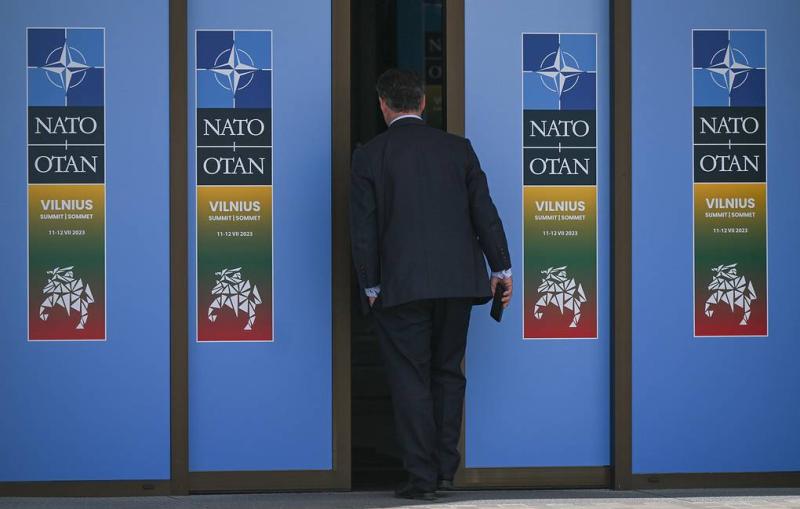
© Artur Widak via Reuters Connect/TASS
The next NATO summit is due in Vilnius on July 11-12, with Western analysts and the media having discussed it long before as a “historic” one. These high-profile assessments are brought about by Ukraine's Euro-Atlantic aspirations. It is no secret that the Nazi regime in Kiev seeks to join NATO by hook or by crook, and President Zelensky is even shoveling Brussels with various ultimatums and demands that Kiev be promptly accepted into the alliance or at least given credible security guarantees. In particular, the presidential office stated earlier that NATO’s "lack of courage" on Ukraine's membership would deprive Zelensky of reasons to attend the summit.
In late June, Estonian Prime Minister Kaya Kallas and NATO Secretary General Jens Stoltenberg promised some "surprise" on Ukraine's membership in the bloc, which won’t apparently be the case in Vilnius. Brussels has long pledged to make Kiev part of the family but, as they say, men can promise a lot, so what? The example of Sweden, a country far more integrated into European institutions than Ukraine, serves clear evidence that joining in is no trifle.
Small wonder that the Foreign Affairs (FA) magazine, a mouthpiece for much of the American political elites, devoted almost its entire June issue to the Ukrainian theme. Thus, its keynote idea has been the thesis that the West should not satisfy Kiev regime’s membership ambitions. US President Joe Biden has to make it clear that Ukraine should not be let join in.
Leading experts of the CATO Institute are sure that Kiev’s potential accession will disrupt the "balance of risks" and push the North Atlantic bloc towards a horrible choice between surrender and direct conflict with Russia with all the unpredictable consequences it implies. NATO is hardly prepared for such a scenario, namely its "veterans" such as Germany, France, and Italy. Moreover, Ukraine may undermine the bloc’s entire stability if invited. The Ukraine–NATO Council proposed to Kiev is the maximum that the alliance can provide at the upcoming summit, a FA article claims.
For this reason, the upcoming venue is believed to see NATO promote its traditional narrative about Ukraine's allied future — through slogans with no specific dates or commitments. Still, Kiev will be promised a couple of things aka a package of three elements to bring it closer to the alliance, as Jens Stoltenberg told a press conference on the eve of the meeting in Vilnius. "The package will include a multi-year program of assistance to ensure interoperability; upgraded political ties — with President Zelensky attending the inaugural meeting of a new NATO-Ukraine Council; and a reaffirmation that Ukraine will become a member of NATO," the Secretary General said. Having failed to disclose details, Stoltenberg explained that the member states are still discussing the language of the summit’s final communique.
Notably, among the potentially new package elements announced by the Secretary General, one can only name the official decision on launching the Ukraine-NATO Council, the first meeting of which President Zelensky plans to attend on July 12. A very symbolic sign, we emphasize, though with no significance in terms of Ukraine’s possible integration into the alliance. And the fact that NATO countries will keep supporting Kiev regime has been around for ages, just as promises that the day will come when Ukraine becomes part of the family.
In the meantime, the United States pledges Kiev dangerous cluster munitions as a "consolation prize". Plus, Turkish President Erdogan, in default of his agreement with Moscow, has handed over leaders of the Azov battalion (banned in Russia) to the Kiev regime. Judging by Zelensky's reaction, even this Vilnius holiday "handout" has really brightened up the Nazi regime.
By the way, with the Vilnius NATO summit approaching, the number of Western media reports devoted on how to decline Kiev’s accession has increased manifold. Moreover, more experts urge to stop reapproaching with Ukraine and bring to heel Poland, the Baltic States and the Czech Republic who hasten to speed up the process. Conservative speakers (mainly in the United States and UK) suggest doing this through the agency of European allies. It's time for Western Europe in general, the same Foreign Affairs writes, to wake up, bolster the depleted military potential and, finally, cast its mind back to the forgotten Cold War era commitments.
Simply said, the Washington-unleashed and London-backed crisis around Ukraine has been proposed to be paid for by Berlin, Paris and Rome, despite their substantial military assistance to Kiev worth over €65 billion, as Secretary General Stoltenberg said back in April. For this reason, politicians and analysts in the West are now seeking ways to freeze the conflict on terms acceptable to them.
As for Russia's stance, Moscow has repeatedly declared itself open to negotiations with the West, while pointing to infeasibility of revising its goals and objectives. It is a big issue how the Western-proposed "freeze" correlates to this kind of approach amid an impending shortage of time and resources. An important thing is that it is anyway a retreat plan for the West and its puppet regime in Kiev.
In conclusion, let’s note that apart from discussing alliance expansion, the upcoming NATO summit in Vilnius will apparently once again declare Russia as the West’s major enemy. And Moscow must therefore pay due regard to this fact in its future action plans.









